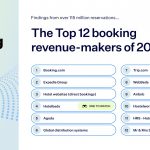It’s no secret that the mobile booking process for hotels trails behind other industries in terms of speed and user experience.
NB: This is an article from Triptease
There’s a clear drop off shown in the graphs below (Figure One; Figure Two; Figure Three) between the number of potential customers visiting a hotel website on mobile, and how many of those visitors go on to search and book on mobile. Scrolling fatigue, a complicated booking journey and slow loading times are all key factors that result in a poor mobile experience.
Subscribe to our weekly newsletter and stay up to date
However, the spike in mobile searches is here to stay, unlocking new opportunities to capture demand. In this quick fire article, we’ll look at some of the common causes of low mobile conversion rates and solutions to help you improve them.
Mobile dominates visits but slumps in conversions
Data drawn from Triptease’s global hotel database exposes a clear trend. The two graphs show visitors (those who visit a hotel’s website) and searchers (those who make a search on the booking engine) across desktop, tablet and mobile.
What do the graphs show? When customers are in their top-of-funnel, research phase, mobile is the device they’re using. When people are looking to research a trip, taking your smartphone out your pocket is much faster than sitting down at a desktop computer. It can be done anywhere, at any time, and provides information quickly and simply.
Figure One
Figure Two
Despite this, desktop switches with mobile to become the prominent device for hotel bookings. Do people feel more confident making bookings on their laptop or PC? Research suggests otherwise. 45% of UK travellers now feel comfortable researching, planning and booking trips to new destinations using only their mobile. This means if you take the necessary steps to improve your mobile UX, you can tap into this demand and increase your direct booking revenue.
Figure Three
The top three UX problems and how to fix them
1. Scrolling fatigue
According to Google, only three out of ten searchers end up completing their purchase, with scrolling fatigue being one of the biggest frustrations. Hotels often do not optimise their content for the smaller screen, meaning travellers will have to scroll endlessly to find the information they need. But the likelihood in them sticking around is slim. You have around seven seconds to capture your visitors’ attention and if they don’t like what they see, they’ll bounce.
How to fix this
Audit your website, reduce the amount of content that customers have to scroll through and make it easy for them to see your room types and offers. If you’ve never run an audit of your mobile website before, you can download our audit worksheet here.
If there’s content you know that particular types of customer will be looking for, you can also combat scrolling fatigue using personalized content. A Nudge Message allows you to put the information you want them to see right at their fingertips.
Read rest of the article at Triptease
The post How Hotels Can Increase Their Mobile Booking Conversion Rates appeared first on Revenue Hub.


































